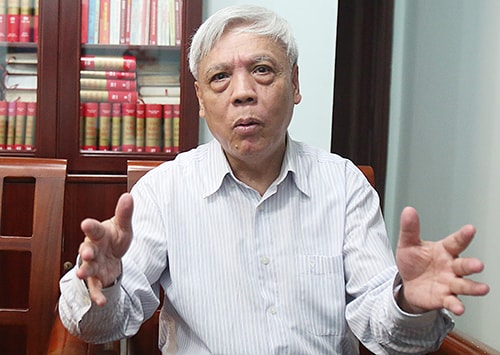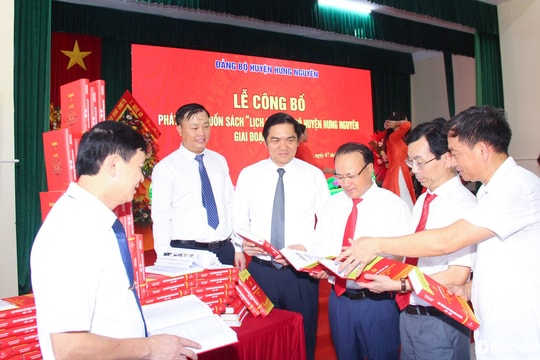'Party agencies must be the first place to streamline the apparatus'
According to Professor Nguyen Trong Phuc, former director of the Institute of Party History, current policies are more subsidized than in the past. A Minister, Secretary... has many regimes.
On October 5, Associate Professor Nguyen Trong Phuc, former Director of the Institute of Party History, shared with VnExpress about streamlining the payroll and rearranging the political apparatus - urgent content being discussed at the 6th Central Conference.
- The General Secretary emphasized the project to continue innovating and streamlining the political apparatus in his opening speech at the 6th Central Conference, suggesting that "whatever is clear and ripe should be resolutely done immediately." What is your comment on this?
- From 1986 to the early 90s, there was a phenomenon of people leaving the state to work outside the state. But then, doing private business was not easy. At the beginning of the 21st century, there was a phenomenon of people flocking to the state. They applied to work in state-owned enterprises, the public apparatus, and even public service units.
Why does this phenomenon occur? Do people flock to the government to contribute to the country’s development or to enjoy themselves? I think Vietnamese people are very sensitive, they do whatever is beneficial right away.
The streamlining of staff and restructuring of the apparatus has been proposed by the Party many times, such as in the resistance war against France, the resistance war against the US and the building of socialism in the North. During Doi Moi, the 6th Congress was a very important change in thinking about the organizational structure and leadership role of the Party, and innovation in leadership style.
After that, we also had several campaigns related to party organization and rectification such as rectification according to the resolution of the 3rd Central Committee of the 7th term in 1992, the 6th Central Committee of the 8th term in 1999, and the 4th Central Committee conference of the 10th term in 2006.
However, this has not created a breakthrough and brought about the desired results. Therefore, I agree that streamlining the payroll and reorganizing the apparatus is something that needs to be done immediately. Through reorganization, the Party can select good cadres and eliminate those who are degraded, power-hungry, have group interests...
 |
| Associate Professor Nguyen Trong Phuc: Streamlining the political apparatus is something that needs to be done immediately because it affects the survival of the regime. Photo: Ngoc Thanh |
- Where should the streamlining of staff and restructuring of the apparatus start?
- Party agencies must be the first place to streamline the apparatus, because in our country the Party rules and leads. If the Party apparatus remains cumbersome, leadership effectiveness will decline.
In addition, there is an overlap between the political and administrative apparatus, requiring unification. For example, the internal affairs agency of the party and the internal affairs agency of the government, or the Central Organizing Committee and the Ministry of Home Affairs jointly handle personnel issues... As for inspection, localities can merge the party inspection and the district party committee inspection committee into the government inspection. Unify to avoid cumbersomeness, avoid the phenomenon of looking at each other, which party does, which state does.
Or the central agency, should we maintain the Central Foreign Affairs Committee or not because the ruling Party, the entire foreign policy has passed through the foreign affairs activities of the state, of the Ministry of Foreign Affairs. Lenin spoke very early about unifying these two agencies (from 1921-1922).
If we put aside the issue of seats and personal interests and instead work for the common good and the development of the country, the entire system from central to local levels can boldly reorganize to be more effective and efficient.
- Some public agencies have more leaders than employees, and the local authorities explain that "it's all according to regulations". What is your comment on this situation?
- Nearly 4 million people are receiving salaries from the state budget, the central government also has to provide budget for the regular activities of 49 provinces and cities. The budget no longer has money for development investment but has to borrow ODA, public debt keeps increasing. Borrowing must be paid, but if we cannot pay now, our children and grandchildren will have to pay. From that, we can see the urgency of streamlining the payroll and rearranging the state apparatus. That is the survival of the country and the regime.
Studying history, I see that it is easy to separate but difficult to merge because it affects the chair. Separating a province is easy because of the new position, position, and regime. The same goes for an agency, it is easy to separate and have a focal point but it is very difficult to merge because when merging, there is only one leader, how can there be two?
I think we need to study how one agency can do many things, but now there is a phenomenon of many agencies doing the same thing. This will lead to shifting responsibility and in the end no one will do it. For example, food safety currently has three ministries: Health, Agriculture, and Industry and Trade. But food safety is still an alarming issue.
I just went to an agency and saw that just preparing a microphone for a teacher to teach in class was done by 3 departments. One department took care of the paperwork for the microphone, another department assembled the machine on the podium, and the third department bought the batteries. That was too cumbersome and inefficient.
Or there is the phenomenon of an official being transferred without knowing where to put him, having to think of a new organization, assigning him to enjoy the regime, without needing to know what this organization's duties are. All of the above manifestations make the government apparatus increasingly bloated.
Therefore, we must define the organization for the work, not for the people. From that organizational model, we can select the people who meet the requirements. I believe that with high determination in this meeting, we will be able to do it. For example, in Quang Ninh, there is a district that has merged the propaganda department with the culture and information department, the inspectorate into the inspection committee, the front merged with the mass mobilization department, the district party committee's organization department merged with the internal affairs department...
- Besides streamlining the apparatus, General Secretary Nguyen Phu Trong also mentioned innovation in leadership methods. In your opinion, how should leadership methods change?
- These two issues cannot be separated. Structure, apparatus, and people must go hand in hand with leadership methods. The Constitution clearly states that the Party's leadership objects are the state and society. If the leadership method is good and perfect, it will enhance the effectiveness of the political system's leadership and management.
President Ho Chi Minh in his work "Reforming the way of working" talked about leadership, in which he only mentioned three points. One is to decide the problem correctly, two is to organize the implementation well, and three is to check and supervise well. We only need to follow Uncle Ho's teachings well to have leaders who are both dedicated and knowledgeable.
Besides, the core is to develop the science of organizational management. Building an organizational system, selecting people, and how the machine operates is a scientific issue. That is the science of leadership and management, linked to organizational science. This does not fall from the sky but must be summarized from practice to find the most effective rules and methods of operation.
- Leadership plays an important role in the process of streamlining the payroll, but people's trust in some leaders has declined. How should this be resolved?
- In my time, in the 1960s and 1970s, there was only one leader, and only 1 or 2 deputies, not as many as now. The reason is that the current policy regime is more subsidized than the subsidy period. A Minister, Chairman, Secretary... has many accompanying policies, from housing, land, vehicles, working conditions and means. Before the renovation, there was no such thing, cadres were only better than others in terms of policies, stamps, and salaries, the difference was insignificant.
In the past, the discipline of cadres was also very strict, so the number of leaders who were disciplined was very small. For example, a commune cadre only needed to embezzle a few dozen kilograms of rice from the cooperative or a few dozen dollars of public funds to be immediately dismissed and expelled. In 1950, Colonel Tran Du Chau, Director of the Quartermaster Department, was executed, showing President Ho Chi Minh's severe punishment for corruption. Strict discipline forced cadres to take care of public affairs, putting public affairs first and not to care about their own personal interests.
Now the number of officials violating the law is too much, in 2016, 74,000 party officials were disciplined at different levels. Each period has its own political tasks and historical circumstances, but we must also consider from history why there are so many corrupt party officials now. As President Ho said in his will, the fight against corruption is a huge battle.
According to VNE


